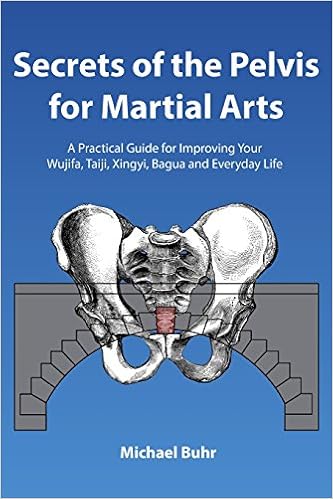I am beginning to see the difference between body movement driven by muscular coordination and body movement that also incorporates a system of fascial connection or what might be called fascial body movement.
Internal strength as I now understand it, is expressed through fascial body movement and not through muscular coordination alone. Developing fascial body movement follows a very different path from developing muscular coordination.
Developing muscular coordination involves developing the gross and fine muscular motor skills and eye-hand coordination for a particular activity. This is the system we use, for example, to learn how to walk, write, play ping-pong, and practice some martial arts forms.
Developing the feeling of fascial body movement involves feeling fascial stretch, noticing where there are gaps in the feeling of fascial stretch, and then eliminating these gaps by linking the areas where you feel stretch to develop full body fascial connection.
In the Wujifa system, internal strength is developed following the path of fascial body movement. Wujifa focuses on developing the feeling of fascial stretch through simple, functional exercises. The core Wujifa exercise is Wujifa Zhan Zhuang with its unique structural alignment points of 1,2,3,4 - 1,2,3,4.
Here is an example of fascial body movement as demonstrated by my instructor. If you don't see any difference between this and the more familiar muscular coordination movement, that's OK. If you don't know fascial stretch, and if you haven't had someone show you many, many times, then distinguishing the two can be difficult or confusing.
In my early years when I was learning and practicing Tai-chi forms and push-hands, I thought that refining my muscular coordination skills would lead to internal strength. After ten years on this path, I discovered that I was no closer to demonstrating internal strength than when I started.
Over the last ten years of learning and practicing Wujifa, I am now beginning to see a difference in how various internal martial arts practitioners move. I notice that only a small percentage of people practicing the internal martial arts actually move with fascial connectedness or fascial body movement. Very interesting....
Even though conceptual understanding is no substitute for actual practice, being able to conceptualize the distinction between Muscular Coordination and Fascial Body Movement has helped me understand why my earlier practicing Tai-chi forms and push hands did not lead to developing internal strength. I hope you find this distinction useful as well.
* * * *
To learn more about developing fascial body movement, check out the following Wujifa articles:
Happy practicing everyone!
Subscribe to:
Post Comments (Atom)


I really enjoy your thinking and work. Now the question is why ? why I shall I develop fascial strength and body ? Efficiency ? Energy ? Ability to use it even in old age ?
ReplyDeleteHi Petr,
DeleteIn Wujia, we have a saying, "The method is not the truth. Once you get the feeling, get rid of the method." The primary principle is *connection*. How many ways can the feeling of connection improve efficiency, energy, and life through old age?
First we begin my learning and understanding the feeling of connection in our own bodies. Once we understand and practice the principle of connection "internally", then curiously enough, this helps us understand how to connect in life.
Discovering and removing blockages and resistances, we create an opportunity for connection; a more efficient transfer of energy.
Thanks. I've spend year practicing Wing Chun Kung Fu (Mai Gei Wong). Some principles are the same I guess. My question was more directed to "martial" abilities and aspects of the style.
ReplyDeleteI guess it's not practical to develop connections and fascias and internal strength for years in order to protect caravans in China :]. One could be decent fighter after couple of months of thai-boxing.
On the other hand, having that "magical" fascial strength and polishing it for years - one would be much better fighter after 10 years of that (or 30 years :)
For health and longevity - we know the answer already. For martial aspect, I'm not sure.
Thank you for your asnwer, I like the ability to connect in life :]
Hi Petr,
ReplyDeleteI'm thinking pretty much the same way. Comes down to "What do you want?" or "What's your purpose for training?" Right?
If you want to learn to survive sudden violence, win bar fights, street brawls, sparring competitions, or MMA titles, or simply get some exercise, there are training regimens for these.
If you want to refine or polish your chosen art over the course of your lifetime and gain some bodily wisdom in the process, this is the ticket.
And all other skills and talents being equal, having connection will give you the edge over someone with no connection. Having more connection than someone with less connection, gives you the edge.. Etc...
So getting back to your original question, "Why should I develop fascial strength?" does this kinda help answer the question?
Yes, it does. Thanks Mike !
ReplyDelete